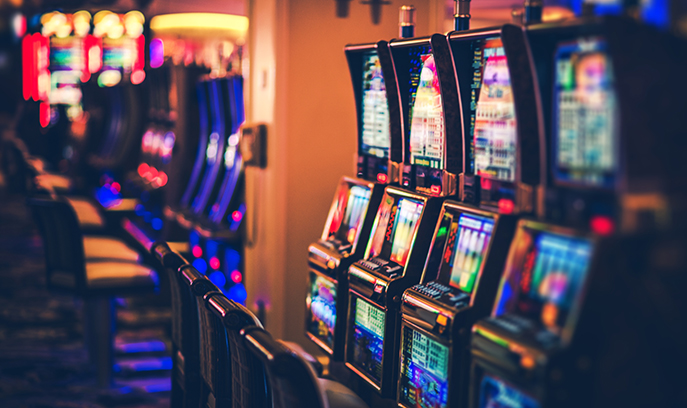States with Legal Gambling Casinos: Where to Find Regulated Casino Gaming Across the US
When I think about the excitement of hitting the jackpot or the thrill of a night out at the slots, I know there’s nothing quite like the atmosphere of a legal casino. Across the United States, more states are embracing casino gambling, turning it into a booming industry that draws millions of visitors each year. Whether you’re planning a quick getaway or just curious about your options, knowing where these legal casinos are can make all the difference.
I’ve noticed that each state brings its own flavor to the casino scene. Some offer glamorous resorts packed with entertainment, while others focus on a more laid-back vibe. If you’re ready to explore the world of legal gambling casinos, I’ll guide you through the states where you can legally try your luck and enjoy the unique experiences each destination has to offer.
Overview of Legal Gambling Casinos in the United States

Overview-of-Legal-Gambling-Casinos-in-the-United-States
Legal gambling casinos operate in numerous states throughout the US, though regulations differ by location. Commercial casino gambling exists in 25 states, including Nevada, New Jersey, Pennsylvania, and Michigan. Tribal casinos function under federal regulation in over 30 states, such as Oklahoma and California. State government involvement includes legislation, licensing, and regulation of casino gaming activity. Each jurisdiction defines the types of permitted gambling activities, such as slot machines, table games, or sports betting. States like Nevada and New Jersey lead the industry with large resort-style properties, while others have smaller venues or tribal-run establishments.
States With Legal Commercial and Tribal Casinos
| State | Commercial Casinos | Tribal Casinos | Sports Betting | Notable Legal Cities |
|---|---|---|---|---|
| Nevada | Yes | Yes | Yes | Las Vegas, Reno |
| New Jersey | Yes | No | Yes | Atlantic City |
| Pennsylvania | Yes | No | Yes | Philadelphia, Pittsburgh |
| Michigan | Yes | Yes | Yes | Detroit |
| Oklahoma | No | Yes | Yes | Tulsa, Oklahoma City |
| California | No | Yes | Yes | San Diego, Sacramento |
| Louisiana | Yes | Yes | Yes | New Orleans, Baton Rouge |
| Mississippi | Yes | Yes | Yes | Biloxi, Tunica |
| Illinois | Yes | No | Yes | Chicago, Joliet |
| Connecticut | No | Yes | Yes | Mashantucket, Ledyard |
State casino laws define the gambling landscape, impacting the range of experiences available. Some states allow only tribal casinos, while others permit both commercial and tribal operations. Sports betting has expanded rapidly, creating additional opportunities for legal casino gaming.
These lawfully operating casinos contribute to local economies, tourism, and entertainment sectors. Casino reviews, revenue data, and regulatory frameworks demonstrate the evolving US gambling market.
Key States With Legal Gambling Casinos
Legal gambling casinos operate in select states, each offering unique regulatory environments and casino experiences. I highlight four states driving the US casino industry, connecting their legal approaches to their distinctive venues and impact on entertainment.
Nevada: The Casino Capital
Nevada dominates casino gambling, driven by robust legislation and mature markets. I see Las Vegas hosting over 140 commercial casinos, including Bellagio, MGM Grand, and Caesars Palace. These venues anchor local economies through gaming taxes, tourism, and employment. Downtown Reno and Laughlin expand options statewide. The Nevada Gaming Control Board enforces strict regulatory standards.
New Jersey: Atlantic City’s Legacy
New Jersey established its reputation through Atlantic City, the second-largest US casino hub. I count nine licensed casinos like Borgata and Hard Rock, concentrated along the iconic Boardwalk. The state’s legal framework allows online casino gaming and sports betting. The Division of Gaming Enforcement oversees operations, fostering compliance and growth.
Mississippi: Riverboat and Land Casinos
Mississippi blends riverboat and land-based casino formats. I locate over 25 casinos in regions such as Biloxi, Tunica, and Gulfport. Casinos like Beau Rivage and Horseshoe Tunica operate under the Mississippi Gaming Commission’s regulations. Flexible policies permit sports betting alongside traditional gaming.
Pennsylvania: Rapid Growth in Gaming
Pennsylvania has expanded casino options rapidly since 2006. I observe 17 licensed casinos, including Parx and Wind Creek Bethlehem, fueling one of the nation’s highest gaming revenues. The Pennsylvania Gaming Control Board manages licensing, gaming expansions, and online betting. The combination of slot parlors, table games, and online wagering diversifies state gaming.
US Casino State Comparison Table
| State | Number of Licensed Casinos | Notable Cities | Online Casino Gaming | Sports Betting Legal |
|---|---|---|---|---|
| Nevada | 140+ | Las Vegas, Reno | No | Yes |
| New Jersey | 9 | Atlantic City | Yes | Yes |
| Mississippi | 25+ | Biloxi, Tunica | No | Yes |
| Pennsylvania | 17 | Philadelphia, Bethlehem | Yes | Yes |
I connect each state’s gaming regulatory body to their casino market framework, ensuring consistency in gambling experiences.
Comparing Casino Regulation Across States

Comparing-Casino-Regulation-Across-States
Casino regulation varies widely in the US due to state-by-state control, creating distinct gaming markets and legal approaches. I see key differences in licensing, legal frameworks, and the relationship between tribal and commercial establishments.
Licensing and Legal Frameworks
States with legal casinos establish unique licensing structures and compliance requirements for operators. I note that some states, like Nevada, use rigid tiered licensing with extensive oversight from agencies such as the Nevada Gaming Control Board. Others, including Michigan and Pennsylvania, use dedicated commissions to set eligibility standards, approve applications, and monitor operations.
| State | Licensing Authority | License Types | Regulatory Model |
|---|---|---|---|
| Nevada | Nevada Gaming Control Board | Restricted, non-restricted | Single, unified statewide board |
| New Jersey | New Jersey Casino Control Comm. | Casino service, operator | Dual agency (commission + division) |
| Pennsylvania | Pennsylvania Gaming Control Bd. | Operator, supplier, employee | Standalone state board |
| Michigan | Michigan Gaming Control Board | Casino, employer, supplier | State-appointed regulatory board |
Application fees, required background checks, and renewal intervals differ. For instance, New Jersey sets minimum capital thresholds while Mississippi focuses on site-based regulation. These frameworks affect casino density, responsible gaming initiatives, and the enforcement of gaming laws.
Tribal vs. Commercial Casinos
Tribal and commercial casinos operate under distinct regulatory and legal frameworks. I observe that tribal casinos, which function in over 30 states, follow the federal Indian Gaming Regulatory Act (IGRA). Tribes create compacts with states, determining permitted game types and oversight powers. For example, California’s tribal compacts allow Class III gaming (slot machines, table games), governed by both state and federal entities.
Commercial casinos, present in 25 states, must meet local zoning laws and pay state and municipal taxes. Regulation is state-specific—Las Vegas casinos adhere to Nevada law, while Atlantic City’s are regulated under New Jersey statutes. Commercial venues undergo more frequent audits and stricter financial disclosure rules than many tribal sites.
| Casino Type | Legal Basis | Oversight | Taxation | Common States |
|---|---|---|---|---|
| Tribal | Federal (IGRA) + State Compact | Tribal+National+State | Revenue-sharing or exempt | OK, CA, WA, MN, NM |
| Commercial | State Law | State Gaming Boards | State/local tax rates | NV, NJ, PA, MS, IL, MI |
Distinct approaches shape gaming options, licensing, and the relationship between casinos and local governments. I find state policies directly impact the gaming landscape through defined responsibilities and economic models for both tribal and commercial venues.
Economic and Social Impact of Legal Gambling Casinos
Legal gambling casinos drive substantial economic activity and shape social trends across multiple states. I’ll highlight how revenue and community benefits arise, while also addressing documented challenges.
Revenue Generation and Local Benefits
Legal casinos generate billions in annual revenue, supporting state and municipal budgets. I see this money funding public education, infrastructure, and healthcare initiatives. For example, Nevada collected over $1.3 billion in gaming tax revenue in fiscal 2023 according to the Nevada Gaming Control Board. Pennsylvania and New Jersey both reported more than $6 billion in total gaming revenue each in 2023 as detailed by state regulatory agencies.
Casinos create jobs and stimulate tourism. In Mississippi, nearly 18,000 casino jobs exist as per the American Gaming Association. Major casino destinations like Las Vegas, Atlantic City, and Biloxi attract millions of visitors annually, boosting local hospitality, retail, and entertainment sectors.
| State | Casino Revenue (2023) | Casino Jobs | Key Beneficiaries |
|---|---|---|---|
| Nevada | $15.5 billion | 72,000 | State funds, tourism, public welfare |
| New Jersey | $6.3 billion | 22,000 | Schools, infrastructure, local tax |
| Pennsylvania | $6.7 billion | 20,000 | Property relief, community programs |
| Mississippi | $2.4 billion | 18,000 | Local tourism, city development |
Addressing Social Concerns
Casinos present social risks alongside benefits. I track issues like problem gambling, addiction, and crime rates. States with legal gambling, such as New Jersey and Pennsylvania, have invested in robust responsible gaming initiatives, allocating funding from casino taxes to prevention and treatment programs per state gaming authorities.
Regulatory frameworks require casinos to offer employee training and self-exclusion lists for players. The Council on Compulsive Gambling of New Jersey reported over 28,000 helpline contacts in 2023, reflecting outreach and early intervention. Law enforcement and research groups monitor shifts in local crime or bankruptcy rates, but studies from the National Council on Problem Gambling show mixed impacts. Community engagement and education remain central in minimizing negative effects.
Future Trends in Gambling Legislation

Future-Trends-in-Gambling-Legislation
State gambling legislation continues to evolve as economic, technological, and social factors reshape the legal casino landscape. Lawmakers pursue expanded casino markets for new revenue streams and job creation, responding to strong demand from residents and tourism stakeholders.
Emerging Casino Legalization Efforts
Several states actively review gambling legislation to permit new or expanded legal casinos. Lawmakers in Texas, Florida, and Georgia, for example, have introduced multiple bills since 2022 for commercial casino legalization or tribal casino expansion. Regulatory reforms in Nebraska and Virginia since 2021 resulted in rapid casino development, with projects planned or underway in Omaha, Norfolk, and Portsmouth.
Digital Gambling and Online Casinos
The popularity of online casinos and mobile gaming has increased states’ willingness to revisit online gambling laws. As of 2024, seven states, such as New Jersey, Pennsylvania, and Michigan, permit full iGaming, while others, including Illinois and New York, continue legislative discussions. Regulatory experiments in remote slots, live dealer table games, and esports wagering mark a broader shift toward digital gambling integration.
| State | Year Legalized Online Casino | Regulatory Authority | Retail Casino Status |
|---|---|---|---|
| New Jersey | 2013 | Division of Gaming Enforcement | Active |
| Pennsylvania | 2017 | Gaming Control Board | Active |
| Michigan | 2019 | Michigan Gaming Control Board | Active |
| Delaware | 2012 | Lottery Office | Limited |
| West Virginia | 2019 | Lottery Commission | Limited |
| Connecticut | 2021 | Department of Consumer Protection | Tribal Only |
| Rhode Island | 2023 | Lottery Commission | Limited |
Tribal-State Compact Evolution
Negotiations between tribes and states frequently address future models of casino operations and online gaming rights. Recent compacts, like Florida’s with the Seminole Tribe, incorporate sportsbook operations, while Oklahoma and California tribes lobby for additional digital gaming authority. Compact renegotiations often drive innovations in responsible gaming protocols and market expansion.
Focus Areas in Casino Legislation
Regulators emphasize several casino industry areas in proposed or updated gambling legislation:
- Mobile and cashless payment integration for casino floor play
- Sportsbook and esports betting expansion inside casinos
- Stricter responsible gaming mandates and exclusion programs
- Real-time industry data collection to inform policy and enforcement
Casino operators in states such as Nevada, Pennsylvania, and Michigan collaborate with lawmakers and regulators to pilot these innovations and support compliance efforts.
Timeline of Major Gambling Legislation
| Year | Key Event | Impact on Legal Casinos |
|---|---|---|
| 2018 | PASPA Repeal | Legalized state sports betting |
| 2019 | Michigan Regulates iGaming | Expanded digital casino market |
| 2021 | Virginia Approves Commercial | New casino licenses issued |
| 2023 | Rhode Island Online Casino Law | First New England iCasino law |
| 2024 | Updated Compacts in Florida | Seminole casino sportsbook |
Conclusion
Legal gambling casinos are reshaping entertainment and tourism across the US. I find it fascinating how each state creates its own flavor of gaming, from the bright lights of Las Vegas to the unique atmosphere of tribal-run venues.
As the industry evolves, I expect even more states to embrace modern trends like online gaming and mobile betting. For anyone interested in exploring legal casinos, there’s never been a more exciting time to see what each state has to offer.
Frequently Asked Questions
Which states have legal gambling casinos in the US?
Over 25 states have commercial casinos, including Nevada, New Jersey, Pennsylvania, and Michigan. More than 30 states feature tribal casinos operating under federal regulations.
What is the difference between commercial and tribal casinos?
Commercial casinos are privately owned and regulated by state agencies, paying state taxes. Tribal casinos are operated by Native American tribes under federal law, with states entering compacts to define regulatory terms and revenue sharing.
How do casinos benefit local economies?
Legal casinos generate billions in revenue, support public services like education and infrastructure, create jobs, and stimulate tourism in major destinations such as Las Vegas and Atlantic City.
Are online casinos legal in the US?
Online gaming is allowed in a number of states, including New Jersey, Pennsylvania, and Michigan. Laws vary by state, so it’s important to check local regulations before playing online.
What responsible gaming measures do casinos provide?
Many states require casinos to offer employee training, provide self-exclusion lists, and fund prevention and treatment programs to address problem gambling.
Which state has the most casinos?
Nevada leads the nation, particularly with over 140 commercial casinos in Las Vegas, making it the casino capital of the US.
Can I sports bet at US casinos?
Sports betting is legal in several states, including New Jersey, Nevada, Pennsylvania, and Michigan. Each state has its own set of regulations for in-person and online sports wagering.
How do state casino laws differ?
Each state defines its own casino regulations, including licensing, permitted gambling types, and tax rates. This means gaming experiences vary widely across the country.
What is the Indian Gaming Regulatory Act (IGRA)?
The IGRA is a federal law that governs how tribal casinos operate, allowing tribes to offer gaming on their lands if states permit it, with regulatory oversight shared between states and the federal government.
What are future trends for legal gambling in the US?
States are exploring expanded casino markets, considering online gambling legislation, and focusing on new technologies and stricter responsible gaming measures. States like Texas and Georgia are actively reviewing casino legislation.
